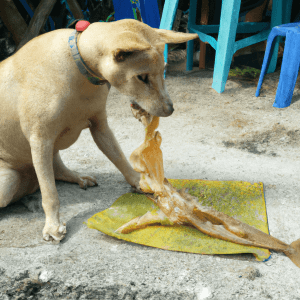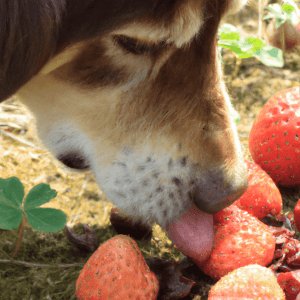Can dogs eat grits are a staple of the Southern United States, and for many, it’s a portion of beloved breakfast food? But what about our four-legged friends? Can dogs eat grits? The short answer is yes, but there are some important considerations to make before adding grits to your pup’s diet. In this article, we’ll discuss the potential benefits and risks of grits for dogs as well as some tips for preparing and serving them.
Are Grits Safe for Dogs? Examining the Pros and Cons
Are grits safe for dogs? It’s a question that’s been asked by many pet owners, and one that we’re here to answer. Let’s first take a look at the pros and cons of feeding your pup grits, so you can make an informed decision. Pros Grits, when cooked, are a good source of carbohydrates and energy for your pup.
They’re also low in fat, making them a healthier option than other treats. Grits are also packed with vitamins, minerals, and antioxidants that can help keep your pup healthy. Cons Grits can be hard to digest, so it’s important to make sure they are cooked properly before giving them to your pup.
Grits can also be high in sodium, so it’s best to avoid giving your pup too much. Overall, grits can be a safe and healthy snack for dogs, provided that they are cooked properly and fed in moderation. If you’re unsure about whether or not to feed your pup grits, consult your vet for advice.
Exploring the Nutritional Benefits of Grits for Dogs
Have you ever heard of grits for dogs? If not, you’re not alone. Although grits are a staple in the Southern United States, many pet owners are still unaware of the nutritional benefits of grits for their four-legged friends. Grits are a great source of carbohydrates and proteins, making them a great addition to a balanced diet for your pup.
What are Grits? Grits are a type of coarsely ground corn that has been boiled and served as a breakfast dish in the Southern United States for centuries. Grits can be made from either yellow or white corn and are typically cooked with butter or cheese for added flavor. Nutritional Benefits of Grits for Dogs Grits are a great source of carbohydrates and proteins, making them an ideal food for dogs.
They’re also an excellent source of fiber and contain a variety of vitamins and minerals, including vitamin B, magnesium, zinc, and phosphorus. Grits are also low in fat and calories, making them a great choice for overweight or obese dogs. They’re also a great source of energy for active dogs, providing sustained energy that won’t cause a sugar crash.
How to Feed Grits to Your Dog Grits can be served as a meal or as a snack. When serving as a meal, you should mix the grits with water or broth to make a porridge-like consistency. You can also mix in some fresh vegetables, like carrots or celery, to add some extra nutrition.
If you’re serving as a snack, you can simply sprinkle the dry grits over your pup’s kibble. Grits can be a great addition to your pup’s diet. Not only are they a great source of nutrients, but they’re also a tasty treat that your pup will love. So, the next time you’re in the South, don’t forget to pick up some grits for your pup. They’ll thank you for it!
Are Grits an Appropriate Meal Choice for Dogs?
No, grits are not an appropriate meal choice for dogs. While grits may be a delicious option for humans, they are not a healthy choice for dogs. Grits are carbohydrate-heavy food that contains very little protein or essential vitamins and minerals to support a canine’s health.
Additionally, many brands of prepared grits contain added butter, sugar, and salt, which can be dangerous for dogs. Eating too much of these ingredients can lead to obesity, diabetes, and other health problems. If you’re looking for a tasty treat to give your pup, consider healthier options like cottage cheese, cooked lean meats, and fresh fruits and vegetables.
How to Cook Grits for Dogs in a Healthy Way
Grits are a great way to add some variety to your pup’s diet and can be cooked in a healthy way to ensure your pup gets all the nutrition they need. Here’s how you can cook grits for your pup in a healthy way. Firstly, make sure you’re using the right type of grit. Choose grits that are made from stoneground whole-grain corn, as this type is the highest in nutritional value and has the most fiber. Avoid instant or quick-cooking grits, as these are usually highly processed and have less nutritional value.
Once you’ve selected the right type of grits, you’ll need to soak them overnight in water. This will help to soften the grains, making them easier for your pup to digest. When it’s time to cook the grits, bring two cups of water to a boil in a pot, and then add one cup of grits and reduce the heat to low. Stir the mixture frequently, and cook for about 20 minutes or until all the water has been absorbed.
Once the grits are cooked, remove them from the heat and add a tablespoon of butter or oil, some salt and pepper, and any other flavorings you’d like (such as shredded cheese or diced cooked vegetables). Stir everything together and serve your pup a warm bowl of healthy and tasty grits. Cooking grits for your pup can be a great way to give them a nutritious and delicious meal. By following the steps above, you can be sure your pup is getting all the nutrition they need in a healthy and tasty way.
Is There a Difference Between Human and Dog Grits?
Yes, absolutely! Human and dog grits are two very different things. Human grits are typically made from corn, which is dried, ground, and boiled. They can be served as a side dish or used as an ingredient in recipes. Dog grits, on the other hand, are usually made from wheat, barley, or oats.
They are usually ground into a coarse meal and mixed with other ingredients, such as vitamins and minerals, to provide a balanced diet for dogs. Dog grits are typically used as a supplement to kibble or wet food. The main difference between human and dog grits is the ingredients that are used.
Human grits are made from corn, while dog grits are made from wheat, barley, or oats. Human grits are usually served as a side dish or used in recipes, while dog grits are used as a supplement to kibble or wet food.
How Can You Tell If Grits are Spoiled for Dogs?
If you’re wondering if your dog’s bowl of grits is still safe to eat, there are a few signs that can help you tell if they’ve gone bad. First, look at the color. If the grits have taken on a grayish hue, then it’s probably time to throw them out! Also, check for an odd smell.
If the grits have a sour, rancid odor, then they’ve gone bad and should be discarded. Finally, look for any signs of mold or other growth on the surface of the grits. If you see anything, then it’s definitely time to discard them and provide your pup with a fresh bowl of grits.
Is It Safe for Dogs to Eat Grits with Butter?
Yes, it is safe for dogs to eat grits with butter. Grits are a popular Southern breakfast food made from cornmeal. They are low in fat, making them a healthy and nutritious snack for your pup. Butter provides essential fatty acids and vitamins that are beneficial for dogs. It also helps to make the grits more flavorful.
However, it’s important to remember that moderation is key when it comes to feeding your pup. Too much butter can cause digestive issues and weight gain. To ensure your pup stays healthy, always make sure to feed them in moderation and adjust their daily caloric intake accordingly.
Another important factor to consider is the type of butter you give your dog. Salted butter should be avoided as it can lead to health issues such as dehydration and electrolyte imbalances. Unsalted butter is the best option. Overall, serving your pup a small portion of grits with a bit of butter is perfectly safe. Just make sure to practice moderation and use unsalted butter.
What Are Some Alternatives to Grits for Dogs?
If you’re looking for alternatives to feeding your pup grits, there are plenty of other options out there. Here are some of the most popular alternatives to feeding your dog grits:
- Oatmeal: Oatmeal is a nutritious and easily digestible grain that is a great alternative to grits. It is high in fiber and is a great source of energy.
- Rice: White or brown rice are both nutritious and easily digested grains that can be a great alternative to grits. Rice is also high in fiber and can provide your pup with a great source of energy.
- Sweet potatoes: Sweet potatoes are a great alternative to grits because they are packed with nutrients and are easily digestible. They are also high in fiber and are a great source of energy.
- Quinoa: Quinoa is a nutritious and easily digestible grain that is a great alternative to grits. It is high in fiber, protein, and other nutrients, making it a great source of energy for your pup.
- Barley: Barley is a nutritious and easily digestible grain that can be a great alternative to grits. It is high in fiber and is a great source of energy.
In conclusion, grits are not a recommended food for dogs due to their high starch content. Too much starch can upset a dog’s digestive system and cause diarrhea. Dogs should also not be given milk, butter, sugar, or salt-flavored grits. The best way to provide your dog with a healthy and balanced diet is to feed them high-quality dog food that is specifically designed for their age, size, and activity level.




